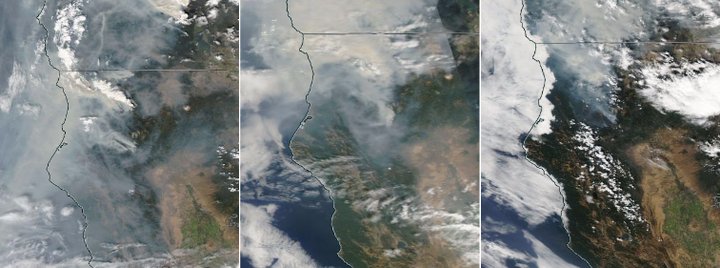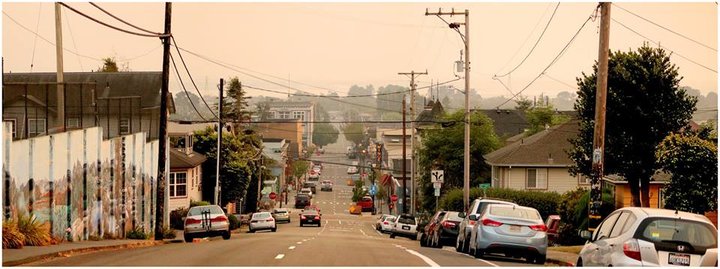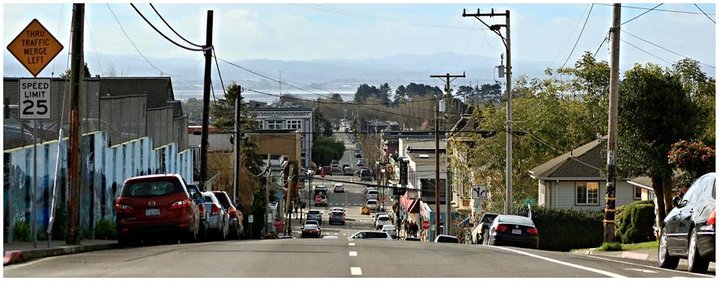
(Left to right) Humboldt’s air quality on the September 4th, 5th and 6th. NASA satellite imagery.
Breathe deep, Humboldt. No air quality alerts are in effect today as the recent string of thunderstorms has washed away the soot from Humboldt’s typically pristine oxygen.
NASA satellite imagery above shows the drastic change in air quality over Northern California before and after the storm between September 4th and 6th.
But enjoy the fresh air while you can. Unfortunately, yesterday’s showers weren’t heavy enough to hinder any nearby wildfires, and Eureka’s National Weather Service office says that northeasterly winds may bring more smoke to our area this weekend.
Read more from the NWS and North Coast Unified Air Quality Management District below.

Comparable before and after photos of our recent smoke conditions. Photos by Andrew J Smith.



North Coast Unified Air Quality Management District press release:
No air quality ADVISORY or ALERTS are in effect for today, however the Temporary Clean Air Center information below has been updated. For today, smoke dispersion conditions have improved significantly with the arrival of cooler temperatures, and has resulted in better smoke dispersion. Pockets of inversions may persist in isolated deeper canyons, trapping smoke.
However, high pressure will build over the region Saturday and remain through Sunday, diminishing smoke dispersion and leading to worsening air quality. Smoke dispersion conditions and air quality near fires will diminish through Sunday as high pressure builds overhead and produces stable conditions. On Monday, the forecast indicates low pressure will return and smoke dispersion conditions should then improve.
The smoke from the Chetco Bar Fire in southern Oregon will remain localized (affecting mainly Smith River).
In Humboldt County: Orleans, Weitchpec, and Hoopa are forecasted to be in the “Moderate” range, however air quality may deteriorate overnight to “Unhealthy for Sensitive Groups” in Orleans. The conditions forecast for the Klamath River drainage may change over the weekend depending on the weather. Willow Creek is forecast to have “Good” conditions. The Humboldt Bay Air Basin (from Trinidad, McKinleyville, Arcata, Blue Lake, Eureka, Fortuna, Ferndale, Rio Dell, to Scotia) is also forecast to have “Good” conditions. Garberville and areas in southern Humboldt are forecast in the “Good” range.
In Del Norte County: Smith River is forecast overall to be “Unhealthy for Sensitive Groups” with “Unhealthy” late morning through early afternoon. Crescent City, Klamath, and Gasquet are forecast to be “Good” with periods of “Moderate”. These conditions may change over the weekend depending on the weather.
In Trinity County: Weaverville and adjacent areas (Lewiston, Junction City, Big Bar, Del Loma) are forecast to have “Good” conditions, which may diminish to “Moderate” or worsen over the weekend depending on the weather.
Temporary Clean Air Centers in Humboldt County:
- Weitchpec Tribal Office, Highway 96, Weitchpec; 9 a.m. to 5 p.m.
- Hoopa Neighborhood Facility, Hoopa Tribal Office, Highway 96, Hoopa; M-F 8 am to 6 pm.
- Karuk Senior Center 459 Asip Road Orleans; (530) 627-3056
- Yurok Tribal Office Highway 96 Weitchpec; (530) 625-4130 - Willow Creek Community Resource Center 38883 Highway 299 Willow Creek; (530) 629- 3141
- Six Rivers Medical Center 850 State Highway 96 Willow Creek; (530) 629-3116
- Eureka Main Library 1313 3rd St. Eureka; (707) 269-1900
Temporary Clean Air Centers in Trinity County:
- American Red Cross Evacuation Shelter, First Baptist Church, 1261 Main St., Weaverville.
- Cox Bar Elementary School, 304 Corral Bottom Road, Big Bar; 10.a.m. to 5 p.m.
Temporary Clean Air Centers in Del Norte County (see also http://preparedelnorte.com):
- Family Resource Center, 494 Pacific Ave, Crescent City; closed 8 p.m. to 10 a.m.
- Tsunami Lanes Bowling Alley, 760 L Street, Crescent City; open during regular bowling alley hours posted at location
- Xaa-wan’-k’wvt Village and Resort (formerly Ship Ashore), 12370 Hwy 101 N., Smith River; closed 8 p.m. to 6 a.m.
Updates will be provided as conditions change. Particulate Matter (PM2.5) monitors are presently in Smith River, Crescent City, Klamath, Gasquet, Orleans, Weitchpec, Hoopa, Willow Creek, Weaverville, Hayfork, Eureka, Scotia, and Garberville.
Subsequent Wildfire Smoke Public Service Announcements will be issued as conditions change. Fire information can be found at http://inciweb.nwcg.gov/ or at www.calfire.ca.gov. Current weather information can be found at www.wrh.noaa.gov.
Health Information for Smoke Impacts
Concentrations of smoke may vary depending upon location, weather, and distance from the fire. Smoke from wildfires and structure fires contain harmful chemicals that can affect your health. Smoke can cause eye and throat irritation, coughing, and difficulty breathing. People who are at greatest risk of experiencing symptoms due to smoke include: those with respiratory disease (such as asthma), those with heart disease, young children, and older adults.
These sensitive populations should stay indoors and avoid prolonged activity. All others should limit prolonged or heavy activity and time spent outdoors. Even healthy adults can be affected by smoke. Seek medical help if you have symptoms that worsen or become severe.
If you can see, taste, or feel smoke, contact your local health department and/or primary healthcare provider. This is especially important if you have health concerns, are elderly, are pregnant, or have a child in your care.
Follow these general precautions to protect your health during a smoke event:
• Minimize or stop outdoor activities, especially exercise
• Stay indoors with windows and doors closed as much as possible
• Do not run fans that bring smoky outdoor air inside – examples include swamp coolers, whole-house fans, and fresh air ventilation systems
• Run your air-conditioner only if it does not bring smoke in from the outdoors. Change the standard air conditioner filter to a medium or high efficiency filter. If available, use the “re-circulate” or “recycle” setting on the unit
• Do not smoke, fry food, or do other things that will create indoor air pollution
If you have lung disease (including asthma) or heart disease, closely monitor your health and contact your doctor if you have symptoms that worsen.
Consider leaving the area until smoke conditions improve if you have repeated coughing, shortness of breath, difficulty breathing, wheezing, chest tightness or pain, palpitations, nausea, unusual fatigue, lightheadedness.
CLICK TO MANAGE